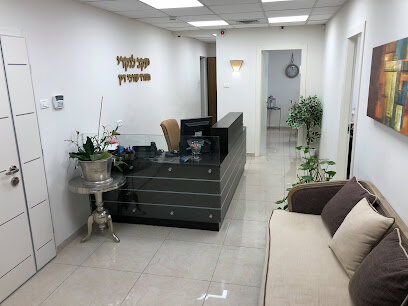Best Commercial Real Estate Lawyers in Afula
Share your needs with us, get contacted by law firms.
Free. Takes 2 min.
Free Guide to Hiring a Real Estate Lawyer
List of the best lawyers in Afula, Israel
About Commercial Real Estate Law in Afula, Israel
Commercial real estate in Afula follows the national legal framework that governs land, planning, building and transactions across Israel, combined with local planning and municipal rules enforced by the Afula Municipality. Property can be privately owned or held under long-term lease from the state or the Israel Land Authority. Commercial property matters commonly involve purchase and sale of land or buildings, leasing of retail and office space, development projects, zoning and change-of-use approvals, construction permits and compliance with municipal regulations such as municipal property tax - Arnona - and conditions for occupancy.
Because commercial real estate transactions and projects often carry substantial financial, regulatory and operational risks, parties generally rely on legal advisers who understand both national statutes and local practices in Afula - including municipal planning approaches, building department rules and typical market contract terms.
Why You May Need a Lawyer
Commercial real estate deals involve complex legal, financial and regulatory steps. You may need a lawyer in these common situations:
- Buying or selling commercial property - to handle due diligence, contract drafting, negotiation and closing.
- Entering or terminating a commercial lease - to draft or review lease clauses, liability allocation, rent indexation, renewal rights and exit conditions.
- Development and construction - to obtain planning approvals, building permits, supervise tender documents, contractor agreements and deal with lien and warranty issues.
- Zoning and change of use - to apply for or challenge zoning decisions, variances or permits required to change use from one commercial category to another.
- Financing and mortgages - to draft and review security documents, loan agreements, and registration of mortgages or liens in the land registry.
- Title, registration and encumbrances - to examine land registry entries, resolve defects, remove liens or claims and ensure clear title.
- Disputes and enforcement - to handle landlord-tenant disputes, breach of contract claims, eviction proceedings, and alternative dispute resolution.
- Tax and structuring - to advise on transaction tax consequences, VAT, capital gains implications and to recommend tax-efficient ownership structures.
Local Laws Overview
Key legal and regulatory aspects relevant to commercial real estate in Afula include the following:
- Land ownership and Israel Land Authority - A significant portion of land in Israel is owned by the state or by public bodies and managed under long-term lease frameworks by the Israel Land Authority. Transactions involving such land often require additional consents and follow specific procedures.
- Planning and Building Law - National planning and building laws set the framework for land use, zoning, subdivision, building permits and enforcement. Local plans and zoning maps, approved by the regional planning committees or the local planning authority, determine permitted commercial uses, density and construction rights in Afula.
- Land Registry - Known commonly as the Tabu, the land registry records title, mortgages, liens and other encumbrances. A full title search is essential to confirm ownership and identify limitations on transfer.
- Municipal regulations - Afula Municipality enforces local rules on municipal property tax - Arnona - business licensing, signage, parking requirements and health or safety regulations for commercial premises.
- Contract law and commercial leases - Commercial leases are primarily governed by contract principles. Unlike many residential leases, commercial tenants typically have fewer statutory protections, so lease terms require careful negotiation on rent, duration, subletting, assignment, repair obligations and termination.
- Taxes and duties - Real estate transactions may trigger VAT, purchase tax, capital gains tax and municipal charges. Tax treatment depends on whether the property is new or used, the nature of the parties, and the structure of the sale.
- Environmental and safety regulations - Certain commercial uses require environmental permits, waste handling approvals, or compliance with occupational safety and fire codes. Industrial or fuel-related activities are subject to stricter controls.
Frequently Asked Questions
What should I review during due diligence before buying commercial property in Afula?
Key due diligence items include: title and land registry entries, existing encumbrances and mortgages, zoning and permitted uses under the local master plan, outstanding building permits or violations, occupancy certificates, municipal debts or arrears such as Arnona, service charges or maintenance obligations, existing leases and tenant rights, environmental reports for industrial sites, and any pending litigation or administrative proceedings affecting the property.
Are commercial leases in Israel regulated differently than residential leases?
Yes. Commercial leases are primarily contractual in nature and parties have broad freedom to agree on terms. Many statutory tenant protections that apply to residential leases do not apply to commercial tenants. That means careful negotiation of rent review clauses, renewal options, eviction remedies and liability for repairs is essential.
Do I need planning permission to change the use of a commercial property?
Often yes. Changing the use of a property - for example converting an office to a restaurant or a retail space to light manufacturing - can require a change in zoning classification or a specific permit from the local planning authority. The need for approval depends on the local master plan and land-use regulations applicable in Afula.
How do I check who owns a property and whether there are mortgages or liens?
You should order a search at the Land Registry - Tabu - which lists the registered owner, mortgages, liens, easements and other encumbrances. A lawyer can obtain and interpret cadastral maps and registry extracts, and advise on whether title is clear or requires cure steps before closing.
What taxes and fees should I expect in a commercial property transaction?
Transactions may involve VAT on the sale of new commercial properties or supplies by businesses, purchase tax depending on the nature of the buyer and property, capital gains tax on sale profits, municipal taxes and fees for registration, and possible betterment assessments related to rezoning or subdivision. Tax implications vary based on transaction structure, so consult both a lawyer and a tax adviser.
How are building permits and occupancy certificates obtained in Afula?
Building permits are issued under the national planning and building framework, with applications submitted to the Afula building department. Required documentation typically includes approved plans, engineer and architect certifications and compliance with zoning limits. Once construction is completed, an occupancy certificate is issued after inspection to confirm the building is fit for use. Work done without permits can lead to fines and retroactive approval processes.
Can I sublet my commercial space or assign my lease?
Subletting and assignment depend on your lease terms. Many leases require the landlord’s consent for subletting or assignment and may set conditions for such consent. Always review and negotiate these clauses before signing, especially if business flexibility is important.
What should landlords include in a commercial lease to protect their interests?
Key landlord protections include clauses on security deposit and guarantees, clear rent and indexation provisions, permitted use restrictions, insurance requirements, landlord access for inspections and repairs, warranties and representations by tenants about business conduct, cure and termination rights for breach, and enforcement mechanisms for eviction and recovery of debts.
How are disputes between landlords and tenants typically resolved?
Disputes can be resolved by negotiation, mediation or arbitration if the lease contains an arbitration clause. Otherwise, disputes are heard by the civil courts. For urgent matters such as unlawful occupation or breach of critical lease terms, landlords may seek court orders for eviction or injunctive relief. Alternative dispute resolution can save time and costs when parties agree to it.
How do I find a qualified commercial real estate lawyer in Afula?
Look for lawyers or law firms with experience in real estate and commercial transactions, preferably with local Afula or regional experience. Ask about their record on similar transactions, ask for client references, confirm bar membership and inquire about fee structures. A local lawyer will be familiar with Afula Municipality practices, local planning committees and typical timelines.
Additional Resources
Useful bodies and resources to consult or contact when dealing with commercial real estate in Afula include:
- Afula Municipality - planning and building department for local zoning, building permits and municipal regulations.
- Land Registry - Tabu - for title searches, registered encumbrances and cadastral maps.
- Israel Land Authority - for matters affecting state-owned land and long-term leases.
- Ministry of Interior and the national Planning Administration - for national planning policies and regional plans.
- Israel Tax Authority - for tax treatment of real estate transactions, VAT and capital gains issues.
- Israel Bar Association - for lists of licensed lawyers and professional standards.
- Local chambers of commerce or business associations in the Jezreel Valley for market information and networking.
- Professional consultants - surveyors, architects, structural engineers and environmental consultants who can assist with technical due diligence and permits.
Next Steps
If you need legal help with a commercial real estate matter in Afula, follow these practical next steps:
- Prepare basic documents - have copies of the title, any existing contracts, municipal notices, current lease agreements and recent tax or utility bills ready for review.
- Seek an initial consultation - contact a commercial real estate lawyer to discuss your objectives, timeline and preliminary risks. Ask about experience with Afula-specific matters.
- Conduct targeted due diligence - instruct your lawyer to perform title searches, zoning and permit reviews, tenant and encumbrance checks, and any required technical inspections.
- Negotiate terms - use your lawyer to draft or revise sale agreements, lease documents or development contracts with clear risk allocation and exit strategies.
- Coordinate with specialists - if needed, retain surveyors, environmental consultants, tax advisers and architects to support legal advice and permit applications.
- Plan for closing and post-closing steps - confirm registration of transfers, mortgage and security filings, payment of applicable taxes and obtaining any required municipal approvals or occupancy certificates.
Commercial real estate in Afula combines national legal frameworks with local administrative practices. Early legal involvement, careful due diligence and local expertise can reduce risk and help you complete transactions or development projects more smoothly. Consult a qualified local lawyer to get advice tailored to your specific situation.
Lawzana helps you find the best lawyers and law firms in Afula through a curated and pre-screened list of qualified legal professionals. Our platform offers rankings and detailed profiles of attorneys and law firms, allowing you to compare based on practice areas, including Commercial Real Estate, experience, and client feedback.
Each profile includes a description of the firm's areas of practice, client reviews, team members and partners, year of establishment, spoken languages, office locations, contact information, social media presence, and any published articles or resources. Most firms on our platform speak English and are experienced in both local and international legal matters.
Get a quote from top-rated law firms in Afula, Israel — quickly, securely, and without unnecessary hassle.
Disclaimer:
The information provided on this page is for general informational purposes only and does not constitute legal advice. While we strive to ensure the accuracy and relevance of the content, legal information may change over time, and interpretations of the law can vary. You should always consult with a qualified legal professional for advice specific to your situation.
We disclaim all liability for actions taken or not taken based on the content of this page. If you believe any information is incorrect or outdated, please contact us, and we will review and update it where appropriate.










